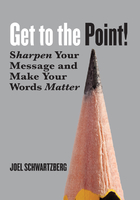
第3章 Introduction
When I was in sixth grade, I gave one of my first formal speeches. Wearing a blue three-piece suit and wide clip-on tie, I competed at a forensics tournament and gave a speech about the neutron bomb, a now-obsolete device designed to minimize property destruction while maximizing human destruction through radiation.
I know, fun stuff for an 11-year-old.
When asked what my speech was about, I simply said, “The neutron bomb.” It was a classic book report: lots of information about what I cheekily called an “explosive” issue, yet it took no position on the issue whatsoever.
I think about that speech often—not just because it was the beginning of a thrilling competitive journey I would continue for the next 11 years—but because it also represents the biggest mistake people make in public communication: sharing information, but not selling a point.
I see that little me in many of my students and clients: important and talented people with critical things to say, yet who deliver simple “who, what, where” book reports, or simply ramble with no clear direction.
These are salespeople who never say, “This product will increase your profits,” activists who never say, “This approach will save lives,” designers who never say, “This style will inspire interest,” and business leaders who never say, “This system will make us more efficient.”
One could wave an accusing finger at our educational system, our media models, even our parenting styles, but I'm less interested in why people are making too many speeches and too few points; I'm more interested in helping them identify and successfully convey their points.
I ended my competitive public speaking career with a national championship in 1990, and what I learned during that time and even more since then is this: no matter who you are, how you're communicating, or who you're communicating with, you benefit tremendously from having a point. After all, without one, everything you say is pointless.
No one is better qualified or equipped to make your specific points than you are, so I hope this book elevates your ability to effectively champion your ideas.